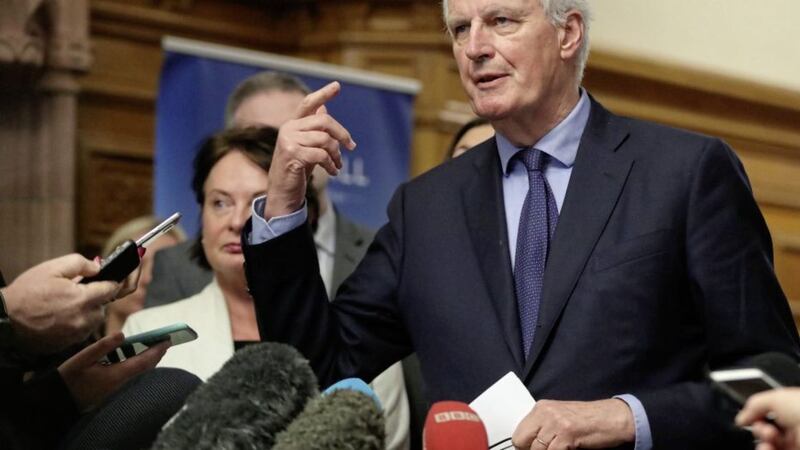Oh good, the French are back. In a modern re-enactment of 1798, the Irish are again celebrating the arrival of a French fleet to support the struggle against the accursed British.
Well, this time it is not really a fleet, just Michel Barnier, a former conservative French cabinet minister who has come to help us rise up against Theresa May - oh, and Arlene Foster.
Like General Humbert, who landed in Mayo with 1,000 French soldiers to help the 1798 rebels, Barnier arrived last week with an army of journalists and EU officials to tell us that help is at hand.
Although Humbert drove the British out of Castlebar with the help of 3,000 Irish armed only with pikes and pitchforks, he was later surrounded at Ballinamuck, Co Longford, and surrendered. The French soldiers were repatriated to France.
But an estimated 2,000 Irish were massacred or later hanged, including Matthew Tone, Theobald's younger brother, despite being an officer in the French army. When it came to the crunch, the French looked after themselves, because several attempts at French intervention here were in the interests of France, not Ireland.
Despite that, the welcome which Barnier recently received in Newry and Derry echoed the wild cheering of the Irish peasantry as Humbert marched through the mountains from Ballina to Castlebar. For a nation obsessed with history, the Irish have learned little from it.
Oh dear, you say, I see that this column has reservations about Ireland's current love affair with the EU. You see correctly. While here, Barnier wrote: "No matter how big or small a country is in the EU, we stand by each other through thick and thin." This is simply not true.
A 2015 report from the European Central Bank (ECB) showed that Irish citizens lost more of their personal wealth than any other eurozone country during the financial crisis. Ireland lost €18,000 per citizen. Greece lost €17,000 and Spain €13,000. Their size guaranteed them a better deal. German citizens' wealth increased by €33,000.
Ironically, it was that same ECB which in 2010 threatened the Irish government with withdrawal of support for Irish banks, unless it paid €63 billion to unsecured bondholders.
It was suspected that Irish taxpayers were subject to an additional levy, despite opposition from the International Monetary Fund (IMF) which went to help French and German banks. It was the biggest robbery of the Irish people since the Act of Union with Britain in 1801.
The ECB's greed also effectively undermined the Irish government of 2011-16, by pressurising it to introduce water charges, while the electorate could see billions of euros flowing to financial speculators. That led to the current instability in Irish politics, where Fine Gael survives only with the help of Fianna Fáil.
No one mentioned that to Barnier. His popularity among nationalists appears to be because he is not British - the same reason unionists do not like him.
Recent history would suggest that Leo Varadkar has been naive in placing his trust in the EU to protect Ireland's interests. Ireland now needs face-to-face negotiations with Britain over the future of the border, particularly since Theresa May is trying to steer her government towards a soft Brexit.
But the EU will not allow Ireland an independent voice and without it, the Irish will once again be slaughtered, this time economically. Ireland already faces threats in the form of a standardised EU tax regime, the exclusion of the IMF from the eurozone and, with Britain gone, even greater centralisation of power in the hands of unelected bureaucrats in France and Germany.
The difference between 1798 and today is that whereas Tone and others wanted to break the connection with England, modern nationalists want to substitute union with Britain with full political union with 26 other states (including the increasingly repressive Poland and Hungary).
The north now has two competing sets of unionists. One favours union with Britain, the other wants union with 26 countries. Whatever happened to Irish political independence?
Mr Barnier said he was here to defend Ireland's interests, but recent history shows that when it comes down to the final EU-UK deal on Brexit, Germany and France will look after their own interests.
General Humbert fought in the French revolution. Politically, Michel Barnier is no General Humbert, but Sinn Féin and the SDLP appear to believe that a French Thatcherite will do more for Ireland than a British one.
As someone once said, those who do not remember the past are condemned to repeat it. Whoever said it may have been thinking of Ireland's experience with French fleets and German banks.









